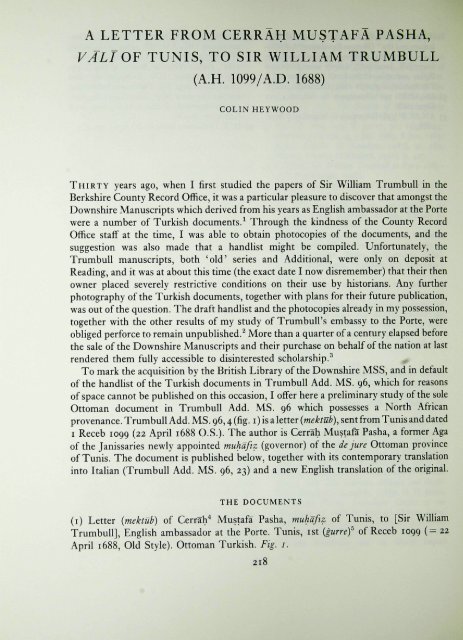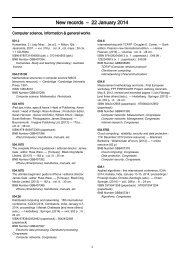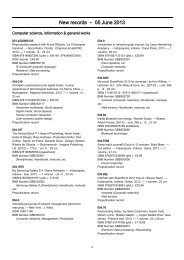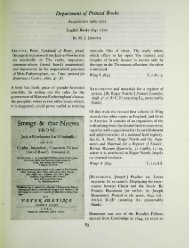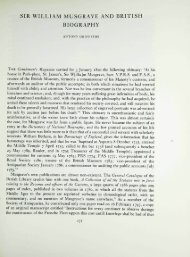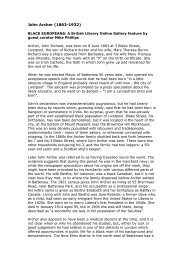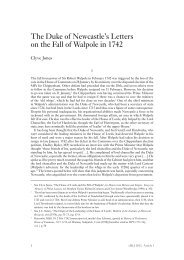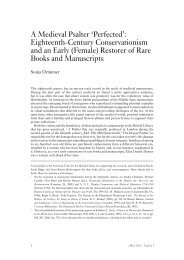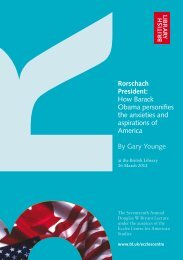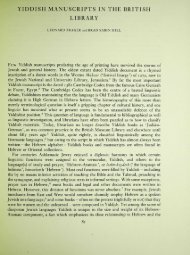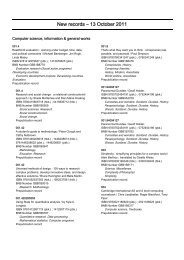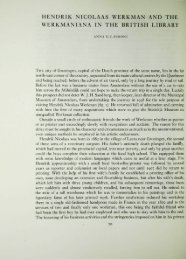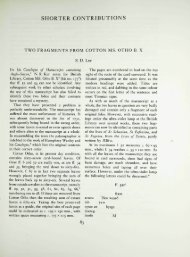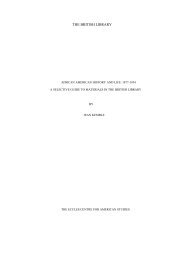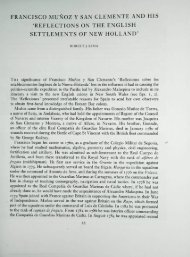A letter from Cerrah Mustafa Pasha, Vali of - British Library
A letter from Cerrah Mustafa Pasha, Vali of - British Library
A letter from Cerrah Mustafa Pasha, Vali of - British Library
Create successful ePaper yourself
Turn your PDF publications into a flip-book with our unique Google optimized e-Paper software.
A LETTER FROM CERRAH MUSTAFA PASHA,<br />
VALIOF TUNIS, TO SIR WILLIAM TRUMBULL<br />
(A.H. 1099/A.D. 1688)<br />
COLIN HEYWOOD<br />
THIRTY years ago, when I first studied the papers <strong>of</strong> Sir William Trumbull in the<br />
Berkshire County Record Office, it was a particular pleasure to discover that amongst the<br />
Downshire Manuscripts which derived <strong>from</strong> his years as English ambassador at the Porte<br />
were a number <strong>of</strong> Turkish documents.^ Through the kindness <strong>of</strong> the County Record<br />
Office staff at the time, I was able to obtain photocopies <strong>of</strong> the documents, and the<br />
suggestion was also made that a handlist might be compiled. Unfortunately, the<br />
Trumbull manuscripts, both *old' series and Additional, were only on deposit at<br />
Reading, and it was at about this time (the exact date I now disremember) that their then<br />
owner placed severely restrictive conditions on their use by historians. Any further<br />
photography <strong>of</strong> the Turkish documents, together with plans for their future publication,<br />
was out <strong>of</strong> the question. The draft handlist and the photocopies already in my possession,<br />
together with the other results <strong>of</strong> my study <strong>of</strong> Trumbull's embassy to the Porte, were<br />
obliged perforce to remain unpublished.^ More than a quarter <strong>of</strong> a century elapsed before<br />
the sale <strong>of</strong> the Downshire Manuscripts and their purchase on behalf <strong>of</strong> the nation at last<br />
rendered them fully accessible to disinterested scholarship.^ ^<br />
To mark the acquisition by the <strong>British</strong> <strong>Library</strong> <strong>of</strong> the Downshire MSS, and in default<br />
<strong>of</strong> the handlist <strong>of</strong> the Turkish documents in Trumbull Add. MS. 96, which for reasons<br />
<strong>of</strong> space cannot be published on this occasion, I <strong>of</strong>fer here a preliminary study <strong>of</strong> the sole<br />
Ottoman document in Trumbull Add. MS. 96 which possesses a North African<br />
provenance. Trumbull Add. MS. 96,4 (flg. i) is a <strong>letter</strong> (mektub), sent <strong>from</strong> Tunis and dated<br />
I Receb 1099 (22 April 1688 O.S.). The author is <strong>Cerrah</strong> <strong>Mustafa</strong> <strong>Pasha</strong>, a former Aga<br />
<strong>of</strong> the Janissaries newly appointed muhafiz (governor) <strong>of</strong> the de jure Ottoman province<br />
<strong>of</strong> Tunis. The document is published below, together with its contemporary translation<br />
into Italian (Trumbull Add. MS. 96, 23) and a new English translation <strong>of</strong> the original.<br />
THE DOCUMENTS<br />
(i) Letter (mektub) <strong>of</strong> <strong>Cerrah</strong>^ <strong>Mustafa</strong> <strong>Pasha</strong>, muhafiz <strong>of</strong> Tunis, to [Sir William<br />
Trumbull], English ambassador at thie Porte. Tunis, ist (gurref <strong>of</strong> Receb 1099 (= 22<br />
April 1688, Old Style). Ottoman Turkish. Ftg. i.<br />
218
^^^^c>443; •<br />
/. Trumbull Add. MS. 96, 4 recto<br />
219<br />
^ .
<strong>British</strong> <strong>Library</strong> (formerly Reading, Berkshire County Record Office), Downshire<br />
Manuscripts, Trumbull Additional MS. 96, no. 4.<br />
Greyish horizontally laid paper <strong>of</strong> European manufacture. Watermark: tre lune.^<br />
Dimensions: 435 cm x 295 cm (external); 19*5 cm x 28 cm (written area <strong>of</strong> recto). No<br />
invocatio; 8 lines text+ 8 lines, inverted, in the right margin {der kenar). Signature <strong>of</strong><br />
<strong>Mustafa</strong> <strong>Pasha</strong> in lower left corner. Small rectangular seal-impression (14x10 mm;<br />
fig. 2) <strong>of</strong> same on verso, behind signature. The document has been folded forward<br />
laterally <strong>from</strong> the bottom eight times, making sections <strong>of</strong> 3-2, 45, 47, 4*9, 5-0, 5-1, 5*2,<br />
5-3, and 5-2 cm.<br />
A <strong>letter</strong> <strong>of</strong> compliments <strong>from</strong> <strong>Cerrah</strong> <strong>Mustafa</strong> <strong>Pasha</strong> to an unnamed English ambassador<br />
(scil. Trumbull), thanking him for arranging his voyage <strong>from</strong> Istanbul to Tunis via Malta,<br />
and promising good treatment for the English merchants in Tunis. Trumbull is also requested<br />
to send news <strong>of</strong> any future political developments at the Porte which might affect the sender.<br />
[recto:]<br />
[V]<br />
220<br />
"> *-^ * [II]<br />
/ iSJ-i u>^ j'
JI "• • • J' [VIII] J<br />
J >-<br />
i (V)<br />
^.^^ < (A)<br />
[in the right margin, inverted:]<br />
j-ljl Ji * j^ V<br />
221<br />
* L .^ «<br />
Li;i ^ .<br />
[X]<br />
^1 J [XII] J.M* 6XJI jLu«iji (^^)<br />
/ ^ J-* J l<br />
[XIII]
[verso:]<br />
[seal impression, in<br />
lower right corner]<br />
[XIV]<br />
JI<br />
'^' v-^ jJ<br />
[^•]^v<br />
(2) Contemporary translation. Italian. Single sheet, folded vertically to make a double<br />
folio, 20 cm X 295 cm, and refolded (after writing) once laterally and four times<br />
vertically to make a flattened tube 6-5x15 cm, which formerly enclosed the previous<br />
document.'' 1-5 pp. text (f. ia-b); f. 2a blank; f. 2b endorsed (in TrumbuU's hand): /<br />
Transla[ti]on o[f] the L[ette]re / o[f] the <strong>Pasha</strong> <strong>of</strong>/Tunis, th[a]t went/in Capt.<br />
Leth[er]Iand[*s ship]. / [slashes]/r[eceive]d the 4. June. [i6]88./[slashes]/.<br />
Watermarks: (i) Cross keys over 'ROMA'; (2) Trifolium with elongated stem<br />
separating the <strong>letter</strong>s CM over Z.<br />
Trumbull Additional MS. 96, 23.<br />
[I]<br />
[II] Doppo li Salutj et Riuerenze fatte verso di \ostra Y^ccellenza IllM5/m.sima [III] La<br />
diamo parte se domanda Amicheuolm^wte per noj, che per Gratia d'Iddio, dopo d'esserci<br />
imbarcati nel Vascello in quelle parti et Inviaticj per costa; In qualonque luogo che siamo<br />
Capitati, per mezzo della Sua Lettera Concessarj, sempre ci portono grand' honore e<br />
Respetto; [IV] Si il Console di Malta, come de Tunis, et cj hanno trattato et honorato<br />
Amicheuolm^Kte[.] [V] Amicitia tale, si troua Solam^wte zpx^resso di lej, et li Suoi: siate<br />
prosperj. [VI] La preghiamo di Continouarla, et per Tauuenire speriamo simile Amista<br />
da lej, desiderando di soccorrerij in tuttj lj nostrv) negotij ch' accadano. [VII] Et tanto per<br />
lj suoi negotij, ch' accaderanwo, quanto di quellj che son appartenenti all Natione Inglese,<br />
et si ritrouano appr^^^o di Noj cj affaticaremwo quanto siamo degnj; [VIII] solam^wte<br />
desideriamo d'esser fermi et Constanti nella di lej Amista.<br />
222
[XI] Et mio Amoreuolissmo Amico desideriamo di far notare et Inuiarcj costi tutte le<br />
Nouita et Cangiam^wti che nascon et succedon' in quelle partj [XII] et Inviarci<br />
[mandarcj] quanti prima tutte le Lett^re de nostr'] Amicj [XIII] et se potra hauer qualche<br />
auuiso dalla parte del Dominio, / toccante il nostro Dimorare o Leuarcj di quj ci far a la<br />
Cortesia di notificarlo Incontinente se sara vero. [XIV] Et sopra questi Negotij<br />
preghiamo la Sua Cortesia, [XV] Et desideriamo di non far Procrastinatione in questo.<br />
[IX] S'e notato allj Vltimj^ della Luna di Regeb L'Anno 1099. [X]<br />
[XVI]<br />
[recto:]<br />
Translation<br />
[I] [He!]<br />
[II] Having enquired, with abundant amity-bearing friendship, <strong>of</strong> the sweet muskscented<br />
mind <strong>of</strong> His Excellency the Lord Ambassador, my affectionate sincere friend,<br />
and having duly performed the <strong>of</strong>fering <strong>of</strong> friendship based on inmost affection, may<br />
[this <strong>letter</strong> find] you in [possession <strong>of</strong>] enjoyment and pleasure joined with health and<br />
prosperity and in cheerfulness <strong>of</strong> heart.<br />
[III] Should you be enquiring as to how we are in these parts (taraftmtzdan); [well], praise<br />
be to God - He is exalted - we embarked (kalyona bin-) at those parts {ol tarafdan [scil.<br />
Istanbul]), [and] while [we were] on the way here, by reason <strong>of</strong> the <strong>letter</strong> [<strong>of</strong> introduction]<br />
{kagtd) which you gave [us], in every place at which we arrived, they showed us the<br />
utmost consideration {re'ayet). [IV] Both the [English] consul {baylos) at Malta and the<br />
consul here at Tunis showed us friendship and consideration. [V] Such friendships<br />
however, is found only <strong>from</strong> you and those [contacts <strong>of</strong> yours]: may you be blessed [for<br />
it]. [VI] And moreover we hope and request that henceforth [we may continue to enjoy]<br />
friendship <strong>from</strong> you and <strong>from</strong> those [contacts <strong>of</strong> yours].<br />
[VII] In our present affairs, to this end both you and your [contacts] and other[s] <strong>of</strong> the<br />
English nation should also let us know [and] whatever their concerns and affairs may<br />
be, as far as we are able we shall extend our best efforts. [VIII] Only with you [too] let<br />
firm and constant friendship be maintained.<br />
[IX] Written on the first (gurre) <strong>of</strong> the month <strong>of</strong> Rajab the Venerated, anno [hijrce] 1099.<br />
[X] The sincere friend / <strong>Mustafa</strong> / governor <strong>of</strong>/Tunis/at present<br />
In the right-hand margin^ inverted:<br />
[XI] And, my affectionate friend, whatever may be the state <strong>of</strong> affairs in those parts {ol<br />
taraf {scil at the Porte]), and what the news may be, who may be in or out <strong>of</strong> <strong>of</strong>fice {tebdtl<br />
ve tagayyur), write and tell me everything about it {cumle kimaht yazub irsal edesiz). [XII]<br />
And whoever <strong>from</strong> amongst our friends may write a <strong>letter</strong> to us, by whatever means there<br />
223
may be [for you] <strong>of</strong> sending it, take [it] and send it to us as soon as possible. [XII] And<br />
if there shall be any news at the Porte <strong>of</strong> our coming or going or staying on [here] and <strong>of</strong><br />
[any political] good luck or misfortune, if it should be verified, whatever news comes to<br />
hand, write and immediately make [it] known [to us]. [XIV] [Assistance in] this<br />
particular point is greatly desired. [XV] May you not refuse or be negligent [in this].<br />
[XVI] 'Attested' {sahh).<br />
[verso:]<br />
The seal <strong>of</strong> Thy love, O Lord / <strong>of</strong> Mankind, [alone] /<br />
is [engraved] in <strong>Mustafa</strong>'s heart / like an inscription in stone<br />
[A.H. io]97<br />
COMMENTARY<br />
(i) Diplomatics<br />
In Ottoman diplomatic usage this document may be classified as a mektub, or <strong>letter</strong>, being<br />
in this case essentially a private (or at the most a semi-<strong>of</strong>ficial) document.^ As such, it<br />
differs in certain details <strong>from</strong> the <strong>of</strong>ficial communications between a provincial <strong>of</strong>ficial<br />
and a representative <strong>of</strong> a Christian state. The invocatio [I]^** appears to be missing. The<br />
forms <strong>of</strong> address [II] (11. 1-2) are cordial; the tone is friendly. There is no expressed or<br />
implied wish for the recipient's conversion to Islam, neither the customary du^aformula<br />
(i.e. khutimat ''awakibihi biU-khayr).^^ which follows the elkab (the name and<br />
honorific appellations <strong>of</strong> the addressee),^^ nor the so-called ' Schliissformel' (i.e. maUsalam<br />
'alaman ittaba'a U-huda)^'^ being employed.^* The actual name <strong>of</strong> the addressee is,<br />
as commonly, omitted.^^ The words el^i beg ('Lord Ambassador') in 1. i are elevated<br />
above the other words in the line, the space which they would have occupied being left<br />
blank. This usage, known as honorific elevation {elevatio)^ was designed to show respect<br />
to the recipient and was frequently employed in Ottoman chancery practice,^® most<br />
commonly for the term sultamm., *my Lord', in ^arzuhals and similar documents. In this<br />
context it is mentioned, but without explanation by Fekete {Einfiihrung, p. lix), but the<br />
origins and ramifications <strong>of</strong> the usage lie at a much deeper level <strong>of</strong> symbolic<br />
significance.^^<br />
The document displays certain elements with regard to <strong>Cerrah</strong> <strong>Mustafa</strong> <strong>Pasha</strong>'s rank.<br />
Although described by Trumbull as the 'pasha' <strong>of</strong> Tunis, he employs in his signature<br />
the term muhafiz}^ He employs no penge in his document, but only the signature {imza)<br />
in the lower left corner. The seal-impression {muhr\ fig. 2) is placed on the verso <strong>of</strong> the<br />
document, directly backing the signature, if the document is signed personally by the<br />
sender: these are all attributes <strong>of</strong> lesser provincial <strong>of</strong>ficials not <strong>of</strong> vizirial rank.^^<br />
Nonetheless, the document bears the sahh {vidimus), which is said by Fekete to be placed<br />
on <strong>letter</strong>s which will bear a penge, or cypher/signature <strong>of</strong> the issuer. In such cases it is<br />
set in the 'bow' <strong>of</strong> the penge. This is not the case in the present document, where the<br />
224
sahh is apparently employed solely to authenticate the 'postscript' ( =11. 9-16) der kenar,<br />
i.e. in the right margin.^**<br />
Fig. 2. Trumbull Add. MS. 96, 4 verso (detail <strong>of</strong> lower right-hand corner)<br />
(ii) Historical Note<br />
The short notice on our <strong>Mustafa</strong> <strong>Pasha</strong> in Mehmed Sureyya's biographical dictionary <strong>of</strong><br />
Ottoman statesmen may be to a certain extent supplemented.^^ According to the Sicilli<br />
^Osmani, <strong>Cerrah</strong> <strong>Mustafa</strong> was a product <strong>of</strong> the Outside Service <strong>of</strong> the Palace, achieving<br />
the rank <strong>of</strong> Imperial Swordbearer {silihdar-i ^ahriyar). In Muharrem 1099 (beg. 28<br />
Oct./7 Nov. 1687) he was given the appointment <strong>of</strong> Aga <strong>of</strong> the Janissaries, but on<br />
account <strong>of</strong> his incapacity in not punishing the mutinous soldiery in the violent emeutes<br />
in Istanbul which had accompanied the deposition <strong>of</strong> the Sultan Mehemmed IV, he was<br />
in the same year dismissed and appointed pasha <strong>of</strong> Tunis. Later, in A.H. I 106 (beg. 12/22<br />
Aug. 1694) he was appointed muhaftz <strong>of</strong> Kars, but died in the following year, A.H. 1107<br />
(beg. 2/12 Aug. 1695).<br />
The background to <strong>Cerrah</strong> <strong>Mustafa</strong> <strong>Pasha</strong>'s fall <strong>from</strong> grace after the accession <strong>of</strong><br />
Suleyman II may be taken a little further. The war with Austria and her allies in the Holy<br />
League in which the Ottomans had found themselves after the failure <strong>of</strong> Kara <strong>Mustafa</strong>'s<br />
ill-considered attempt in 1683 to seize Vienna had been a catalogue <strong>of</strong> disasters. Buda,<br />
the seat <strong>of</strong> a beglerbegi, and the administrative centre <strong>of</strong> Ottoman Hungary, had fallen to<br />
a siege by Austrian and allied forces late in the campaigning season <strong>of</strong> 1686; less than<br />
a year later the Ottomans were to sustain a bloody defeat in the field at the hands <strong>of</strong><br />
Austria in the second battle <strong>of</strong> Mohacs (12 August 1687), the news <strong>of</strong> which reaching the<br />
Porte had coincided with the arrival there <strong>of</strong> Trumbull. ^^ The defeat had led to a<br />
widespread mutiny in the army and the flight <strong>of</strong> the Grand Vizier Suleyman <strong>Pasha</strong> <strong>from</strong><br />
225
the front to refuge at the court. Serious social and political unrest broke out in Istanbul.<br />
On 25 August a large fire devastated a great part <strong>of</strong> the city; a week later, on i September,<br />
part <strong>of</strong> the Topkapi palace was burned down. The Grand Vizier Suleyman <strong>Pasha</strong>, to<br />
whom Trumbull had written on 29 August to accompany his formal <strong>letter</strong>s <strong>of</strong><br />
accreditation,^^ was sacrificed by the Sultan Mehemmed IV to the mob and the army,<br />
and was replaced by Siyavush <strong>Pasha</strong>, the army's nominee. The political situation,<br />
however, rapidly worsened, leading on 2 Muharrem 1099 (29 October 1687, O.S.), to the<br />
deposition <strong>of</strong> the Sultan and the placing <strong>of</strong> his brother on the throne as Suleyman 11.^^<br />
The accession <strong>of</strong> the new Sultan was followed by far-reaching changes <strong>of</strong> personnel both<br />
in the immediate entourage <strong>of</strong> the Sultan, and in the Ottoman 'ruling institution'<br />
generally. These developments took place against a background <strong>of</strong> continuous unrest in<br />
Istanbul, particularly amongst the janissary and sipaht troops stationed there. Ins<strong>of</strong>ar as<br />
they concern <strong>Cerrah</strong> <strong>Mustafa</strong> <strong>Pasha</strong>, they may be recapitulated as follows.<br />
On 6 Muharram/2 November, Morali Hasan aga, the then Swordbearer to the Sultan<br />
{silihdar-i ^ahriyar; silihdar-i padi§ahT), who had been Swordbearer to Mehemmed IV<br />
since 1095/1684, was dismissed and appointed z^a/r <strong>of</strong> Egypt.^^ The vacant position was<br />
filled by <strong>Cerrah</strong> <strong>Mustafa</strong>, but he held <strong>of</strong>fice for only nine days, for on 15 Muharram/ii<br />
November the mutineers, enraged at the non-payment <strong>of</strong> the customary donative on the<br />
accession <strong>of</strong> a new Sultan, rioted, and demanded the deposition <strong>of</strong> the Aga <strong>of</strong> the<br />
Janissaries, Cado Yusuf a^^z, who was quickly sent into exile at Jiddah.^^ <strong>Cerrah</strong> <strong>Mustafa</strong><br />
was now appointed Aga <strong>of</strong> the Janissaries, while his former post was given to Elmas<br />
Mehmed aga, a future Grand Vizier under Suleyman IPs successor, <strong>Mustafa</strong> II."<br />
<strong>Cerrah</strong> <strong>Mustafa</strong> remained Aga <strong>of</strong> the Janissaries until i Rabl' II, 1099 (25 January 1688),<br />
when he was appointed commandant {muhafiz) <strong>of</strong> the Dardanelles fortress <strong>of</strong> Seddulbahr.<br />
This appointment he never took up, for on the seventh <strong>of</strong> the same month (31 January)<br />
the post was given to the Grand Vizier's locum tenens at the Porte {ka^im-makam-i rekabi<br />
humayun), Kopriilli-zade <strong>Mustafa</strong> <strong>Pasha</strong>, and <strong>Cerrah</strong> <strong>Mustafa</strong> was made valt <strong>of</strong> the<br />
distant and largely autonomous province <strong>of</strong> Tunis.^^<br />
This effective exile <strong>from</strong> the centres <strong>of</strong> power and influence to a remote and largely<br />
nominal provincial posting was the development which brought <strong>Cerrah</strong> <strong>Mustafa</strong> <strong>Pasha</strong><br />
into contact with Trumbull. In his diary for i February 1687/8 (O.S.), that is to say, on<br />
the day following <strong>Mustafa</strong> Kopriilti's appointment as commandant <strong>of</strong> Seddulbahr,<br />
Trumbull noted that '[the Imperial Dragoman Alessandro] Mauro Cordato came in<br />
[the] morning ab[ou]t a ship to carrie [a] Bascha to Tunis'.^^ The Porte, as always, had<br />
moved fast to rid itself <strong>of</strong> politically disgraced functionaries: within hours <strong>of</strong> his<br />
dismissal, steps were taken to find a convenient means <strong>of</strong> conveying <strong>Cerrah</strong> <strong>Mustafa</strong> into<br />
gilded exile.<br />
Mavrocordato's enquiry <strong>of</strong> i February eventually bore fruit. Evidence for this is to be<br />
found in a <strong>letter</strong> dated i March 1687/8 <strong>from</strong> Trumbull to Goodwyn, the English consul<br />
in Tunis, which was sent by the hand <strong>of</strong> the 'Hasnardar'^*^ <strong>of</strong> the new <strong>Pasha</strong> <strong>of</strong> Tunis<br />
and on an English ship commanded by one Capt. ^^<br />
226
The bearer here<strong>of</strong> being Hasnardar to Gerah Mustapha (late Janisar Aga but now made Pacha<br />
<strong>of</strong> Tunis) desired me to give him this L[ette]re to addresse him to you; w[hi]ch by reason <strong>of</strong> many<br />
civilities shewed by his Master to my self & o[u]r Nation, I could not refuse, perswading my self,<br />
that It can be no disadvantadge to you but rather <strong>of</strong> use to keepe a freindly Correspondence with<br />
him, I hope you will accordingly let him know that my recommendations have had some weight<br />
with you; And w[hat]t kindness you shall shew him, shall upon the like occasion be returned to<br />
any friend <strong>of</strong> yours in these parts...^^<br />
The further course at Tunis <strong>of</strong> <strong>Cerrah</strong> <strong>Mustafa</strong> <strong>Pasha</strong>'s rather unsuccessful career, and<br />
his relations there with Consul Goodwyn and the English merchant community, lie<br />
outside the scope <strong>of</strong> this short note. The ongoing correspondence which he sought with<br />
Trumbull appears not to have been continued, if the negative evidence <strong>of</strong> TrumbuU's<br />
own Turkish Letter-Book may be taken at face value ;^^ however, it may not be without<br />
significance that <strong>Cerrah</strong> <strong>Mustafa</strong>'s own <strong>letter</strong> to Trumbull, published above, also fails to<br />
find a place in it, and further research, for which at present both time and space are<br />
lacking, may yet allow reconstruction in greater detail <strong>of</strong> this seventeenth-century<br />
Anglo-Ottoman encounter.<br />
1 The twenty-five Turkish documents in the<br />
uncalendared Trumbull Additional Manuscripts,<br />
together with a number <strong>of</strong> contemporary<br />
translations and some other material, have been<br />
gathered together in an unbound bundle under<br />
the rubric 'Turkish Letters and Documents'<br />
and classified as Trumbull Additional Manuscript<br />
(henceforth TAMS) 96.<br />
2 Cf. my 'English Diplomacy between Austria and<br />
the Ottoman Empire in the War <strong>of</strong> the Sacra<br />
Liga,... 1689-1699', unpublished London Ph.D.<br />
dissertation, 1970.<br />
3 My grateful thanks are due to Miss Sonia<br />
Anderson, <strong>of</strong> the Royal Commission on Historical<br />
Manuscripts (H.M.C.), for kindly drawing<br />
my attention to the acquisition <strong>of</strong> the<br />
Downshire MSS by the <strong>British</strong> <strong>Library</strong>.<br />
4 Cerrak (< Arabic jarrah), in Ottoman usage =<br />
*surgeon', 'dresser <strong>of</strong> wounds'. The cerrah-bap<br />
was the chief surgeon at the Ottoman court.<br />
5 Gurre (Ar. gurra), the first day <strong>of</strong> a lunar month.<br />
On the non-numerical denominators {gurre.,<br />
muntasaf {'middle')y and selh Mast day') in the<br />
dating <strong>of</strong> Ottoman documents see Ludwig [ =<br />
Lajos] Fekete, Einfuhrung in die Osmanisch-<br />
Turkische Diplomatik der Turkischen Botmdssigkeit<br />
in Ungarn^ iste. Lieferung (Budapest:<br />
Universitatsdruckerei, 1926), p. xl.<br />
227<br />
6 This well-known watermark <strong>of</strong> three sequentially<br />
disposed crescent moons, found particularly in<br />
paper <strong>of</strong> European, especially Venetian, manufacture<br />
destined for the Ottoman market, is<br />
characteristic <strong>of</strong> Ottoman documents <strong>of</strong> the<br />
period (cf. Franz Babinger, Das Archiv des<br />
Bosniaken Osman Pascha (Berlin: Reichsdruckerei,<br />
1931), pp. 30-2, and V. Nikolaev,<br />
Watermarks <strong>of</strong> the Mediaeval Ottoman Documents<br />
in Bulgarian Libraries, vol. i (all published)<br />
(S<strong>of</strong>ia, 1954). I have not attempted to identify<br />
here either the particular tre lune watermark on<br />
TAMS 96, 4, or the watermarks in the succeeding<br />
document below (TAMS 96, 23). I remit<br />
these identifications to a fuller study and edition<br />
<strong>of</strong> the Turkish documents in the Trumbull<br />
Papers, long ago begun, on which I am now in a<br />
position to resume work.<br />
7 Although the <strong>letter</strong> <strong>of</strong> <strong>Cerrah</strong> <strong>Mustafa</strong> and its<br />
translation were found separately when TAMS<br />
96 was examined c. 1963, the ingrained discoloration<br />
affecting all <strong>of</strong> what had obviously been at<br />
least for many decades previously the upper<br />
external surface <strong>of</strong> the translation, and all except<br />
the corresponding (and unaffected) mid-section<br />
<strong>of</strong> <strong>Cerrah</strong> <strong>Mustafa</strong> <strong>Pasha</strong>'s <strong>letter</strong>, shows this to<br />
have been the case.<br />
8 Sic, for 'primi' {gurre).
9 On the mektub type <strong>of</strong> document see Fekete,<br />
Einfuhrung, pp. xlviii-liv; for a short discussion<br />
<strong>of</strong> the diplomatics <strong>of</strong> private <strong>letter</strong>s, op. cit, pp.<br />
lx-lxi.<br />
10 The Roman numerals supplied (in square<br />
brackets: '[I]', etc.) refer to the relevant sections<br />
<strong>of</strong> the document and its translations. On the<br />
invocatio {= da^vet; Ar. da'wa, 'a calling upon<br />
[God]') in its simplest form, the initial <strong>letter</strong> 'A'<br />
<strong>of</strong> hiive (Ar. huwa, 'He!'-5«7. Allah), see<br />
Fekete, Einf, pp. xxx, ff. The Muslim invocatio<br />
was also employed in documents emanating<br />
<strong>from</strong>, e.g., the Turkish chanceries <strong>of</strong> Christian<br />
embassies at the Porte (cf., for English usage -<br />
in this case, 'A'-cf. TAMS 96, 6a, [Trumbull]<br />
to [Siyavu§ Pa§a, Grand Vizier], 'duplicat[e]',<br />
n.p., n.d. The Italian version-or original(.^)-<br />
(TAMS 96, 6b), which impHes an issue date<br />
<strong>of</strong> 11 Oct. 1687, O.S., does not bear an<br />
invocatio.<br />
11 Arabic:' May his ends (Ar. ''awakib, pi. <strong>of</strong> 'akiba)<br />
be terminated in good' - i.e., may he become a<br />
Muslim in his lifetime (on the du'a formulae cf.<br />
Fekete, Einf, pp. xxxvii, xlix).<br />
12 On the elkab formulae in general, see Fekete,<br />
Einf, pp. xxxiii, ff. (for Christian rulers, pp.<br />
xxxv-vi, xlviii-ix).<br />
13 Arabic:' And peace be upon him who follows the<br />
right path' (i.e. Islam). Cf., for the 'Schlussbegrussungsformeln'<br />
in general, Fekete, Einf.,, p.<br />
liii.<br />
14 Cf., for the use <strong>of</strong> these formulae in <strong>letter</strong>s<br />
referring or addressed to Trumbull, TAMS 96<br />
nos. (a) 8a (a firman <strong>of</strong> Suleyman II, III.<br />
Muharrem 1099 to <strong>Mustafa</strong>, janissary aga (i.e.,<br />
*our' <strong>Cerrah</strong> <strong>Mustafa</strong>), and —, bostanct-ba^i,<br />
regarding the import <strong>of</strong> wine by the English<br />
embassy ('khutimat' formula only); (b) 3 (a<br />
mektub <strong>of</strong> Siyavu§ Pa§a, Grand Vizier, Edirne,<br />
n.d.); (c) II (a mektub <strong>of</strong> Tekirdagli <strong>Mustafa</strong><br />
Pa§a, Grand Vizier, Edirne, n.d.).<br />
15 This common Ottoman usage in secular documents<br />
seems not to have been observed in<br />
legal-religious documents: cf. TAMS 96, 8b,<br />
the hiiccet ('legal attestation', 'legally authenticated<br />
act') issued on 5 Rebl* I, 1099, by ^eyh<br />
Mehmed, cadi <strong>of</strong> the Istanbul port quarter <strong>of</strong><br />
Tophane, in certification <strong>of</strong> the provisions <strong>of</strong><br />
TAMS 96, 8a (= doc, (a) in n. 13 supra), which<br />
refers by name to the 'English ambassador'<br />
{Ingiliz [< Fr. 'anglais'?] Wfm; but cf., in<br />
Ottoman secular documents, the almost uni-<br />
228<br />
versal usage <strong>of</strong> Ingiltere {< Ital. Inghilterra)<br />
elgisi), 'Sir WilliamTnimbuir (S[e]R VlL[yi/<br />
ye?]MTUR[u]MBAL).<br />
16 And also, <strong>of</strong> course, by non-Muslim chanceries<br />
which imitated Ottoman usage in their own<br />
communications in Turkish to the Porte (cf., for<br />
English usage TAMS 96, 6a (see n. 13, supra):<br />
elevatio in 1. i <strong>of</strong> sultamm, 'My Lord').<br />
17 For the Far Eastern, specifically Chinese, origins<br />
<strong>of</strong> 'honorific elevation', see Joseph E. Fletcher,<br />
'China and Central Asia, 1368-1884*, in John<br />
K. Fairbank (ed.). The Chinese World Order:<br />
Traditional China's Foreign Relations (Cambridge,<br />
Mass., 1968), pp. 206-24, 337-68, at pp.<br />
212, 352-3 (a discussion <strong>of</strong> the diplomatic<br />
subtleties inherent in the Chinese practice, in the<br />
context <strong>of</strong> the surviving Persian version <strong>of</strong> a<br />
<strong>letter</strong> sent in 1418 <strong>from</strong> the Ming Emperor Chu<br />
Ti to the Timurid ruler Shah Rukh). The<br />
adoption and practice <strong>of</strong> elevatio in the Ottoman<br />
context has been exhaustively examined by<br />
Pr<strong>of</strong>essor Menage in his important study 'On<br />
the Constituent Elements <strong>of</strong> Certain Sixteenth-<br />
Century Ottoman Documents', Bulletin <strong>of</strong> the<br />
School <strong>of</strong> Oriental and African Studies, xlviii/2<br />
(1985). PP- 283-304.<br />
18 Cf., for parallel contemporary usage, the titulature<br />
and signatures employed in <strong>letter</strong>s <strong>from</strong><br />
pashas <strong>of</strong> Belgrade to Trumbull's successor. Sir<br />
William Hussey, and to his successor Lord Paget<br />
(London, SOAS, Paget Papers, unpublished<br />
Turkish Documents). I am currently working on<br />
a study and text-edition <strong>of</strong> these documents.<br />
19 Cf. Fekete, Einfuhrung, pp. iff.<br />
20 Fekete, loc. cit.<br />
21 Mehmed Sureyya, Sicill-i 'OsmanT, 4 vols.<br />
(Istanbul, 1308/1890-1315/1897; rpt. Famborough,<br />
1971), vol. iv, p. 409.<br />
22 Trumbull had arrived in Istanbul in August<br />
1687 (Heywood, 'English Diplomacy', p. 71; cf<br />
the firmans regulating his arrival and the<br />
departure <strong>of</strong> his predecessor Chandos: (a) a<br />
firman dated III. Ramadan 1098 [= 21-30 July<br />
1687], issued in response to a petition {'arzuhaf)<br />
sent by Trumbull to the Porte on his arrival at<br />
Izmir, and addressed to the vezTr <strong>Mustafa</strong> <strong>Pasha</strong>,<br />
commandant {muhafiz) <strong>of</strong> Bogaz Hisan and<br />
the cadis and castellans {dizdars) <strong>of</strong> Kilidiilbahr<br />
and Sultaniyye, ordering them on receipt <strong>of</strong> the<br />
firman to permit the ship bringing the new<br />
English ambassador to the Porte to pass the<br />
Dardanelles, and to see that the envoy be
furnished with provisions at the authorized rate<br />
and sent speedily and swiftly formard to the<br />
Porte ('Turkish Letter-Book', P.R.O., SP no/<br />
88, f. I* [= 254r]); and (b) a further firman,<br />
dated II. Zi'I-ka'da 1098 [= 8-18 Sept. 1687],<br />
addressed to the cadis <strong>of</strong> Gelibolu (Gallipoli)<br />
'and at the Straits' castles and in the Aegean'<br />
{Bogaz Hisarlari ve Ak Denizde vaki' kadtlar),<br />
the dizdars <strong>of</strong> the Dardanelles fortresses, and<br />
subordinate functionaries, ordering them to<br />
permit the ship taking Chandos (' Konte<br />
Sandu9'), * latterly recalled by his King <strong>from</strong> his<br />
post as English ambassador at the Porte and<br />
gTanted permission by the Sultan to depart'<br />
(ibid., f. 2* [=253r]).<br />
23 Trumbull to Suleyman <strong>Pasha</strong>, 29 Aug. 1687<br />
(P.R.O., SP 110/88, 'Turkish Letter-Book' (see<br />
below, n. 33), ff. 5*-6* [= 25or, 249r]: the<br />
<strong>letter</strong>s <strong>from</strong> the King to the Sultan and to<br />
Suleyman <strong>Pasha</strong> (copy <strong>of</strong> the latter, ibid., ff.<br />
3*~4* [= 252r, 25ir]) have been handed to the<br />
latter's kaymakam for transmission (cf. also<br />
Trumbull to the re'is efendi, [n.d. but? 29 Aug.<br />
1687 (ibid., ff. 7*-8*)], communicating the<br />
rather stale news <strong>of</strong> the death <strong>of</strong> Charles II and<br />
the accession <strong>of</strong> James, and also announcing his<br />
own selection by the latter as English ambassador<br />
at the Porte).<br />
Memories <strong>of</strong> the fiscal exactions and indignities<br />
suffered by the English community up to<br />
more than a decade earlier under Kara <strong>Mustafa</strong><br />
<strong>Pasha</strong> (Grand Vizier 1676-83) were still fresh in<br />
London: James IPs <strong>letter</strong> to Suleyman <strong>Pasha</strong><br />
referred pointedly to his hopes that Trumbull<br />
might receive honourable treatment and that the<br />
King's merchants and subjects in the Ottoman<br />
dominions {memalik-i mahrusede olan tiiccar ve<br />
re'ayalarimtz) might trade freely and in security,<br />
'unlike the situation which obtained in the grand<br />
vizierate <strong>of</strong> Kara <strong>Mustafa</strong> <strong>Pasha</strong>'.<br />
24 The military and political crisis in the Ottoman<br />
Empire in the latter part <strong>of</strong> 1687 needs a<br />
satisfactory study. For a conspectus <strong>of</strong> the events,<br />
based largely on Ottoman chronicle sources, see<br />
J. von Hammer, Geschichte des Osmanischen<br />
Reiches, 10 vols. (Pest, 1827-35 i ^P^- Graz,<br />
1961), vol. vi, pp. 49<strong>of</strong>f.<br />
25 Mehmed Ra§id, Tar'ih'^, 5 vols. (Istanbul,<br />
1282/1865), vol. ii, p. 16.<br />
26 Ibid., vol. ii, p. 20.<br />
229<br />
27 Fmdiklih Mehmed aga, known as Silihdar,<br />
TarJh, 2 vols. (Istanbul, 1928), vol. ii, p. 306.<br />
28 Ra§id, op. cit., vol. ii, pp. 24-5.<br />
29 Trumbull, 'Diary', BL, Add. MS. 52279, f. 97b.<br />
30 I.e. <strong>Cerrah</strong> <strong>Mustafa</strong>'s household treasurer<br />
(Arabo-Pers. hazTnedar, vulg. Turk, 'haznadar',<br />
* Keeper <strong>of</strong> the Treasury').<br />
31 Trumbull Letter Books, vol. i (TAMS 94/1), p.<br />
154: 'Consul Goodwyn by the Hasnardar to<br />
Pacha <strong>of</strong> Tunis p[er] Cap[tain] Letherland'.<br />
Captain John Letherland (or Leatherland) was<br />
an experienced ship's master in the Levant trade<br />
during this period. Circa 1694 he was master <strong>of</strong><br />
the 'Eagle' {Calendar <strong>of</strong> Treasury Books, vol. x,<br />
p. 411); the following year he is recorded as<br />
commander <strong>of</strong> the 'Richard', one <strong>of</strong> the ships<br />
returning in the Turkey fleet convoy in September<br />
1695 (ibid., p. 1216).<br />
32 Trumbull was already acquainted with Goodwyn.<br />
He had conducted negotiations at Tunis en<br />
route for the Porte (he was there between 20 and<br />
25 June 1687, H.M.C., Downshire MSS., vol. i,<br />
p. 251) and also at Malta (27-29 June, ibid.).<br />
Goodwyn (Goodwin) was a partner in the<br />
Marseilles-based firm <strong>of</strong> Goodwin and Martin<br />
(cf. his <strong>letter</strong>s to Trumbull, op. cit., pp. 251, 253,<br />
255-7)-<br />
33 TrumbuU's Turkish Letter-Book, covering the<br />
entire period, almost four years, <strong>of</strong> his embassy<br />
at the Porte (P.R.O., SP 110/88: ' Registro delle<br />
Lettere Turchesche scritte da Sua Eccellenza il<br />
Cavagliero Gughelmo Trumbull Ambasciatore<br />
della Sua Maesta della Gran Bretagna &c al<br />
Supremo Vesir et altri della Porta Ottomana, e<br />
dei Commandi Imperiali nel tempo della sua<br />
Ambasciata cominciando dal Giorno 17 Agosto<br />
1687 sin al Giorno 29 di Giugno 1691') contains<br />
register copies (made in the cancellaria <strong>of</strong> the<br />
English embassy), in Ottoman Turkish together<br />
with the corresponding Italian translations/<br />
originals, <strong>of</strong> 151 documents, including the<br />
majority <strong>of</strong> the Turkish documents (and <strong>of</strong> the<br />
surviving Italian translations <strong>of</strong> the lost Turkish<br />
originals) which are preserved in TAMS 96. An<br />
edition <strong>of</strong> the Turkish texts in SP 110/88 is<br />
currently in progress; the relationship between<br />
the original documents and the register copies<br />
will be explored in a forthcoming publication<br />
(see above n. 6).


